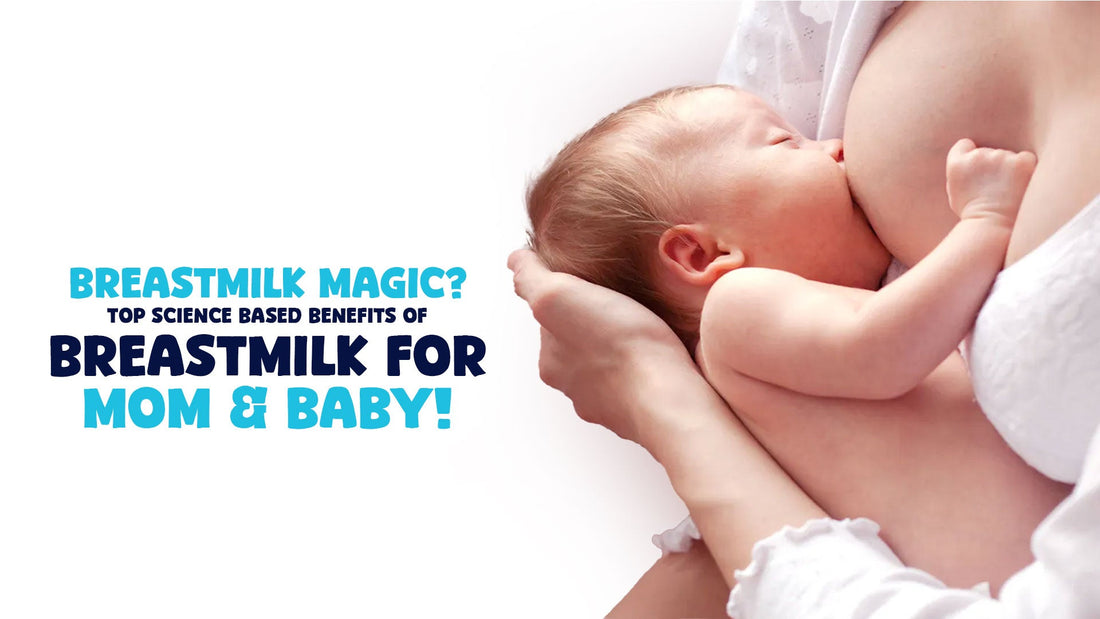
Breastmilk Magic? Top Science based benefits of breastmilk for Mom & Baby!
Share
In Pakistan, breastfeeding has always been part of tradition, but many new mothers still wonder: Is breastmilk really as powerful as people say? Modern science answers with a clear YES. Breastmilk is not just food—it’s medicine, immunity, nutrition, and emotional bonding all in one.
From boosting your baby’s immune system to protecting mothers from long-term health risks, breastfeeding is truly magical. In fact, doctors, lactation experts, and the World Health Organization (WHO) recommend exclusive breastfeeding for the first 6 months.
Here are 10 science-backed benefits of breastfeeding that prove why breastmilk is the best first gift for your baby and a health boost for moms in Pakistan.
1. Boosts Baby’s Immune System Naturally
Breastmilk contains powerful antibodies that fight viruses and bacteria. In Pakistan, where infections like diarrhea, pneumonia, and respiratory illnesses are common in infants, exclusive breastfeeding can literally save lives.
2. Perfectly Tailored to Your Baby’s Needs
Unlike formula, breastmilk changes its composition according to your baby’s age, health, and even the time of day. Think of it as a personalized nutrition plan designed by nature—no factory-made milk can compete with that.
3. Supports Brain Development
Breastmilk is rich in DHA and ARA, essential fatty acids that play a key role in baby’s brain and eye development. Research shows breastfed babies may perform slightly better on IQ tests and learning milestones later in life.
4. Reduces Risk of Sudden Infant Death Syndrome (SIDS)
Studies prove that breastfeeding lowers the risk of Sudden Infant Death Syndrome (SIDS), especially in the first 6 months. It also promotes safer sleep patterns for babies, giving moms extra peace of mind.
5. Promotes Digestive Health
Babies in Pakistan often face issues like colic, constipation, and gas. Breastmilk is gentle on the stomach, easier to digest than formula, and contains natural enzymes and probiotics that strengthen the gut.
6. Acts Like a Natural Vaccine
In areas where healthcare access may be limited, breastmilk acts as the baby’s first vaccine. It protects against infections such as measles, ear infections, diarrhea, and pneumonia—all major causes of infant mortality in Pakistan.
7. Supports Maternal Health Too
Breastfeeding benefits moms as much as babies. It helps:
- Reduce the risk of breast and ovarian cancer
- Aid postpartum weight loss
- Delay the return of menstruation (a natural method of birth spacing)
For Pakistani women, where breast cancer rates are rising, this is an especially important benefit.
8. Emotional Bonding and Mental Health
Breastfeeding releases oxytocin—the “love hormone”, which strengthens the mother-baby bond. It also lowers stress and reduces the chances of postpartum depression, a challenge many new moms face but often go undiagnosed in Pakistan.
9. Saves Money and Time
Formula feeding is costly in Pakistan, especially with rising prices. Breastmilk is:
- 100% free
- Always available
- Safe without sterilization or preparation
It saves families thousands of rupees and countless hours.
10. Environmentally Friendly
Breastfeeding leaves zero environmental footprint. No plastic bottles, no packaging, no transportation. In a country like Pakistan, where environmental issues are growing, breastfeeding is the most sustainable baby food choice.
Final Thoughts
So, is breastmilk really magic? Science and tradition both say YES! From stronger immunity to long-term maternal health, breastfeeding is more than a choice—it’s a public health solution for Pakistan.
Whether you’re a first-time mom in Karachi, a working mother in Lahore, or raising a baby in a smaller city, choosing breastfeeding can make a lifelong difference for both you and your child.
Breastfeeding in Pakistan isn’t just a cultural practice—it’s the smartest, healthiest, and most natural decision you can make.
